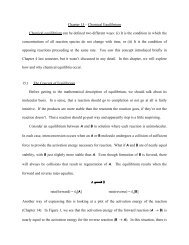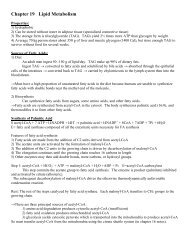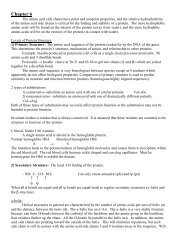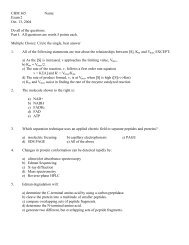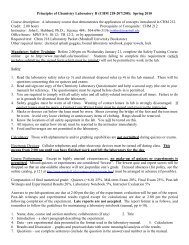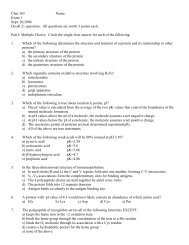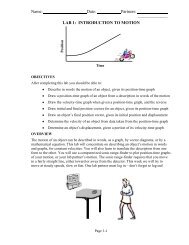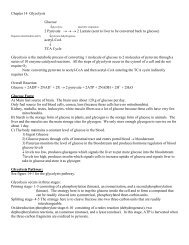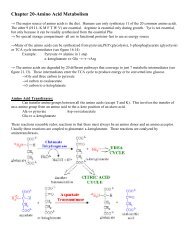THE DHAMMAPADA: THE WAY OF THE BUDDHA, VOL. 9-12 The ...
THE DHAMMAPADA: THE WAY OF THE BUDDHA, VOL. 9-12 The ...
THE DHAMMAPADA: THE WAY OF THE BUDDHA, VOL. 9-12 The ...
Create successful ePaper yourself
Turn your PDF publications into a flip-book with our unique Google optimized e-Paper software.
106 <strong>THE</strong> <strong>DHAMMAPADA</strong>: <strong>THE</strong> <strong>WAY</strong> <strong>OF</strong> <strong>THE</strong> <strong>BUDDHA</strong>, <strong>VOL</strong>. 9-<strong>12</strong><br />
He says, ”I was as unconscious as you are; now I have become conscious and all my fears and sorrows have<br />
disappeared. One day I was like you, one day you can be like me; there is no qualitative difference between us.<br />
I am awakened, you are asleep; that is the only difference. I am not extraordinary, I am just as ordinary as you<br />
are. <strong>The</strong> only thing that has happened to me is that I have opened my eyes and you are still keeping them closed.<br />
Open them and see for yourself!”<br />
<strong>The</strong> sutras:<br />
IT IS NOT IRON THAT IMPRISONS YOU NOR ROPE, NOR WOOD, BUT <strong>THE</strong> PLEASURE YOU TAKE<br />
IN GOLD AND JEWELS, IN SONS AND WIVES.<br />
IT IS NOT IRON THAT IMPRISONS YOU... your prison is not that gross, it is very subtle. It is not so<br />
visible, it is very invisible. It is transparent. It is not that you remain in the prison; on the contrary, the prison<br />
surrounds you, wherever you go it moves with you. It is something in your mind, not something around your<br />
body. It is something in your very approach towards life.<br />
He says: IT IS NOT IRON THAT IMPRISONS YOU NOR ROPE NOR WOOD, BUT <strong>THE</strong> PLEASURE<br />
YOU TAKE IN GOLD AND JEWELS....<br />
Now one thing very significant has to be remembered: this sutra has been misinterpreted for centuries. Twentyfive<br />
centuries of misinterpretation are there. For the first time I am telling you that it does not mean what<br />
Buddhists have been saying that it means. <strong>The</strong>y think it means that gold and jewels have to be renounced; it<br />
does not mean that it is so clear BUT <strong>THE</strong> PLEASURE YOU TAKE IN GOLD AND JEWELS.... It is not<br />
the gold that binds you but the PLEASURE that you take in it. If you don’t take pleasure in it you can live in a<br />
palace and you are as free as anybody who lives in a cave in the Himalayas. If you take pleasure in your cave in<br />
the Himalayas you are as unfree as anybody who lives in a palace. <strong>The</strong> question is psychological.<br />
And one thing more: why do you take pleasure in the palace, in gold, in jewels, in diamonds? <strong>The</strong>y all decorate<br />
your ego. Your ego is empty in itself, it is nonexistential. You have to continuously go on pouring things into it so<br />
it goes on giving you the sense that it is something substantial. It is constantly demanding, ”Give me this, give<br />
me that.” It goes on demanding. It exists in the demand, it exists in the desire.<br />
It is just like when you are on a bicycle: you have to peddle it continuously. If you stop peddling, maybe for a<br />
few feet the bicycle may move out of the past momentum, but then it is bound to fall. Ego is just like a bicycle:<br />
you have to continuously peddle. If you stop peddling it falls then and there, flat on the ground.<br />
So if you have a palace it will demand a bigger palace and it will take great pleasure in the palace. It will<br />
brag about it, it will feel very puffed up. If you are a president of a country, it feels very puffed up. If you<br />
become famous, respectable, it becomes very puffed up. And the ways of the ego are very subtle. It moves in<br />
your unconsciousness, in the darkest layers of your being. It can take pleasure in gold, it can take pleasure in<br />
renouncing gold, but it is the same thing.<br />
I know many so-called saints who go on bragging still after thirty or forty years. Forty years before they had<br />
renounced the world and they still go on saying that ”We renounced so much money, so much gold.” Still they go<br />
on talking about it! Forty years have passed, but they are still taking the pleasure.<br />
You see the point? You can take pleasure when you have gold, you can take pleasure when you renounce gold.<br />
In fact, when you have gold you can’t take so much pleasure as when you renounce it. Why? because millions<br />
of other people have gold, it is nothing very special. But when you renounce you are a rare person: your ego<br />
becomes more extraordinary, holier-than-thou, superior.<br />
I know one person who was a homeopathic doctor. Now, you know about homeopathic doctors they somehow<br />
manage to live. Very rarely I had seen any patients visiting him. Yes, a few people used to come they used to<br />
come to read the newspapers! In fact, that’s how I started going to his dispensary to read the newspapers and<br />
to have a little chitchat, and then we became friends. He was always talking about his troubles and he was very<br />
much worried.<br />
And then one day I heard that he had renounced the world; he became a saint. After three years I met him<br />
in Calcutta. He was worshipped, and people were telling me that he had millions of rupees that he renounced. I<br />
said, ”Don’t be stupid I know this man! He had only three hundred and sixty rupees in the bank!” Now they<br />
have become millions!<br />
When you renounce you can go on increasing your amount; nobody can prevent you and nobody can check on<br />
it no auditing is possible. You can go on spreading the rumor how much you have renounced.<br />
When I saw him, I asked him, ”Doctor....”<br />
He said, ”I am no longer a doctor.”



